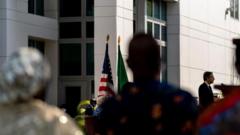The burial of former Zambian President Edgar Lungu will take place in South Africa after his family and the government clashed over funeral arrangements. This is the first instance of a former head of state from another country being buried in South Africa, sparking widespread debate about national mourning protocols and political relations.
Controversy Surrounds Burial Arrangements for Zambia's Former President Edgar Lungu

Controversy Surrounds Burial Arrangements for Zambia's Former President Edgar Lungu
A dispute over funeral arrangements leads to Edgar Lungu being buried in South Africa instead of Zambia, raising questions about political tensions.
In a surprising turn of events, the family of Edgar Lungu, former President of Zambia, has announced that he will be interred in South Africa following a tumultuous disagreement with the Zambian government regarding his funeral arrangements. Lungu, who served as Zambia’s sixth president from 2015 to 2021, passed away earlier this month in South Africa while receiving treatment for an undisclosed illness.
Initially, the government had planned for a state funeral to take place in Lusaka, Zambia’s capital, but relations soured when the family refused to permit the repatriation of his remains. President Hakainde Hichilema, who was prepared to receive the coffin with honorable military ceremony, stated that Lungu should be buried "with full honours" in Zambia, reinforcing that as a former president, Lungu belongs to the Zambian nation.
Family spokesperson Makebi Zulu later expressed gratitude towards the South African government for respecting their wishes and emphasized that they preferred a private ceremony. Lungu's funeral is the first instance of a former head of state being buried outside their country, prompting discussions about the significance of his burial in South Africa.
Tensions escalated as President Hichilema decided to abruptly end the national mourning period previously meant to run until June 23. He indicated that the country needed to return to normalcy, with the family’s resistance prompting accusations from the opposition Patriotic Front (PF) that the government had politicized the funeral arrangements. PF acting president Given Lubinda lamented the situation, pointing out that the occasion should not have devolved into a political matter.
Civil society groups have called for a swift resolution to the issue that respects the legacy of the late president while uniting the nation. Religious leaders have echoed these sentiments, urging humility and dialogue in what they described as a situation that undermines Zambia's dignity.
Despite leaving office, Lungu remained a significant political figure and continued to be critical of his successor. The aftermath of this controversy showcases the complicated dynamics of Zambian politics, reflecting on how the country grapples with the memories of its leaders.



















